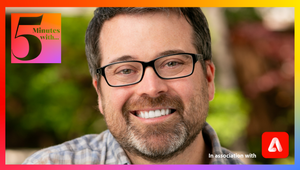
Meet the Technologists: Lewis Smithingham

Adobe XD is a proud supporter of LBB. Over the upcoming months, as part of the sponsorship of the Digital Craft content channel, we will be spending time with some of the most innovative and creative minds in the industry.
In the latest edition of Digital Craft, we sit down with Lewis Smithingham, SVP of innovation at Media.Monks. That day job sees him identify innovative digital opportunities, through which he helps usher brands and partners into the future with creative and technical expertise. Amongst his extra-curricular activities is a seat on the World Economic Forum’s Metaverse Council, where he is part of a working group on Value Creation in the metaverse.
To discuss all of this and what it means for brands looking to navigate a virtual future, LBB’s Adam Bennett sat down with Lewis…
LBB> Lewis, let’s start at the very beginning - what kind of a kid were you growing up, and at what point did you come to consider yourself as a ‘creative’ person?
Lewis> I was a problematic child. I have ADHD and I’m autistic. So I was held back a lot, got into plenty of fights, and never found a space in which I felt comfortable until I discovered theatre aged seven. But I was never an academic high-achiever, or anything like that. I was flagged pretty early on in high school as being, to put it diplomatically, “not destined for college”.
So at that point your careers guidance officer will give you roughly three options. Something like truck driving, cabinet-making, or video production. So I figured, well, video production seems like it could at least be fun.
Fortunately, I ended up behind the camera at around the same time as my friends’ bands were getting big. I became known as the dude who just happened to be available and ready to shoot videos - the result being that by the time I was 17 I had five DVD deals with Universal. I remember walking around Walmart and Target, seeing my DVD on the actual shelves. It was crazy. From that moment, I had this creative career sort of happening to me. I can remember having this out-of-body experience working with Fallout Boy who were absolutely huge at that point in time.
LBB> And digital creativity’s gain has been cabinet-making’s loss, you could say.
Lewis> Ha, maybe. But I’ve never considered myself as a ‘creative’ in the classical sense. I’m a maker. Or a producer. There’s a kind of working class ‘DIY’ attitude hard-wired into my brain which, honestly, was part of the reason why I wanted to work with Media.Monks. DIY is a huge part of our culture. We’re a team of so many diverse and creative makers who, ultimately, know how to get things done.
LBB> Alongside the day job, you’re also a member of the Metaverse Council at the World Economic Forum. How have you seen attitudes towards the metaverse evolve since the word first became part of our industry’s consciousness?
Lewis> Well look, I don’t like the word itself. And honestly I never liked it. It was literally invented by a Sci-Fi writer to describe a dystopian future. That’s not a great look.
LBB> So what’s a better term to describe it?
Lewis> It’s really too nuanced for a single word, but one I think about a lot is virtualisation. And I think about that in the context of the fourth industrial revolution. It’s the fundamental idea that this industry is evolving from what it exists as now into a more virtualised context.
And this isn't a theory. It’s happening. Digital twins, for example, is a concept that’s picked up a lot of momentum. There are digital twin systems for security, for training, for experiments, for clothing manufacturers and countless more use cases besides those. The more we get into synthetic and virtual representations the more we understand that pixel-perfect representations of the real world are delivering on the true promise of the metaverse as it was initially understood. And that’s not about hype, it’s about practicality.
By the way, since this conversation is happening thanks to Adobe I just want to mention how closely their technology is connected to all of this potential. At Media.Monks we use Frame.io, Adobe Premiere, After Effects, Media Encoder, you name it. Substance 3D is huge for us when it comes to creating high-quality digital textures for our digital twins. So their software is vital in delivering on the promise of a true metaverse.
Technically speaking, a true metaverse is a digital world on top of our physical world where everything has object permanence. That permanence can be derived from digital means, i.e. crypto, or from physical meaning like scanning a real-world diamond with its own unique signature. And when you begin to understand all of that, that’s where the mind-boggling potential of this idea begins to grow.
This doesn’t mean we’re going to be living inside Ready Player One tomorrow, of course. There’s a significant amount of change or technological growth required to even make that vaguely achievable.
LBB> That’s all good and fair, but what do you make of how, according to a poll conducted last year, only 7% of Americans said the metaverse made them feel “more excited” about the future? What’s behind that?
Lewis> Well, my response to that poll would be to ask them to find something that actually does make Americans excited about the future. That’s not an easy thing to do right now for all sorts of reasons.
I can tell you that the metaverse makes me personally feel more hopeful. For one thing, what’s not to love about better videogames and more space?
If you wanted to get a little more serious, then I’d argue that an environmentally sustainable future is achievable through virtualisation. If you look at the major cloud providers in the United States, almost all of them are legitimately carbon-negative at this point.
There’s this image of a dystopian future that sadly the metaverse has become a part of in humanity’s collective consciousness. But that’s not how I see it.
LBB> What does all of this mean for brands? How do you think they will stay relevant in the future media ecosystem you’re talking about?
Lewis> You need to provide something of value in order to be noticed. It’s really as simple as that, and it’s why at Media.Monks we talk so often about brand ‘experience’ because it needs to be very holistic and imaginative.
Zooming out for a second, advertising is always going to be - to a certain degree - a propaganda industry. At least in the sense that it often produces media that people actively seek to avoid. That’s especially true in virtualised spaces where people will ask “hey why the hell are you interrupting my videogame?”.
So brands need to strive to create stuff that fits in, that feels cultural, and is an organic part of their audience’s lives. There isn’t a shortcut to that, but it absolutely can be done.
Look at what Nike did in Fortnite. As a sneakerhead, I thought that was totally rad. I didn’t feel like I was engaging with an ad, I felt like I was engaging with culture.
Likewise, I don’t know if you remember Chex Quest but it was this wild thing in the 90s where they basically licensed Doom and used it to create this bizarre, non-violent first person shooter videogame which also worked as a promotion for Chex cereal. It’s crazy how ahead of its time that was - that’s exactly the kind of thing brands should be looking to do today.
LBB> So brands should be creating their own Fortnite-style Battle Royale game, is that what we’re saying?
Lewis> Well why not?! Chex Quest was something that I actively wanted to play as a kid in the 90s. Why shouldn’t that be desirable for any brand? And if it worked for a breakfast cereal then there are countless brands it could work for.
In virtual spaces you need to be the thing that people walk towards, not what they walk past to get there. That’s what we really need to understand to get the most potential out of where technology is taking us as a species, I believe.
LBB> And, before we wrap up, are you confident that all brands do have the potential to become that thing? To avoid becoming virtual wallpaper?
Lewis> Yes. And in fact, I can talk about something that we’re currently working on to help with that. We recently launched our Fan-Focused AI Highlights Tool powered by tech from NVIDIA, AWS and Adobe, which breaks down an event, or even a TV show or a movie, into something hyper-relevant to the person watching.
So for example, I watch March Madness from the perspective of being a sneakerhead rather than a basketball fan. That means that, currently, I need to sit through a lot of stuff that isn’t really interesting to me in order to get to the content I want. Our tool will allow for highlights to be packaged together in a way that speaks directly to the interests of an individual, meaning it’s all relevant. And a brand has an opportunity to own and present that highlight package.
Off the top of my head, let’s say that you’re the Kansas City Chiefs and you’ve suddenly got a ton of attention from Swifies because their idol is attending your games. Why not put out a highlights package specifically for them which shows all the cuts of how she’s responding to the game? You don’t need to stop serving up traditional content for your long standing fans, but you can still make good use of this opportunity to create new ones.
To answer your question, that’s how you avoid becoming virtual wallpaper. Connecting with people means you need to be relevant to them - and there’s no shortcut or substitute for relevance in a virtual space.















